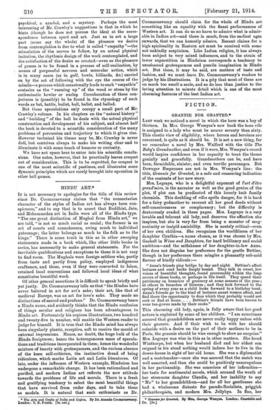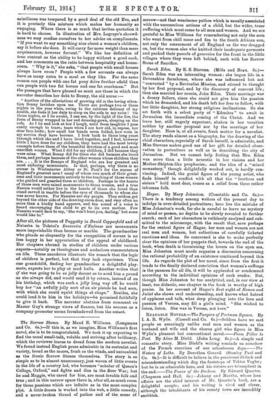FICTION.
GRANNIE FOE GRANTED.*
LAEIT week we noticed a novel in which the hero was a boy of thirteen. In Mrs. George Wemyss's new book the beau 2-die is assigned to a lady who mast be nearer seventy than sixty. This elastic view of eligibility, where heroes and heroines are concerned, is quite as it should be. It is not a new thing, for we remember a novel by Mrs. Walford with the title The Baby's Grandmother, and even if it were, Mrs. Wemyss's record would inspire confidence in her capacity to treat the theme genially 'and gracefully. Grandmothers can be, and have been, formidable, sinister, and even terrific personages. But Dowager Empresses are not in Mrs. Wemyss's line: the title. Grannie for Granted, is a safe and reassuring indication of the contents of her new story.
Mrs. Legraye, who is a delightful exponent of Part d'être grand'mere, is the narrator as well as the good genius of the plot, if plot can be predicated of this loosely knit family chronicle. This doubling of ram spells danger, for it is hard for a fairy godmother to recount all her good deeds without self-conscionsness or complacency; bnt the difficulty is dexterously evaded in them pages. Mrs. Legraye is a very lovable and tolerant old lady, and deserves the affection she inspires, but she is very far from being a monster of mag- nanimity or insipid amiability. She is acutely critical—even of her own children. She recognizes the worldliness of her daughter Cynthia—a name chosen, as it was chosen by Mrs. Gaskell in Wires and Daughters, for hard brilliancy and social ambition—and the selfishness of her danghter-in-law Anna. She does not disguise her preference for the gentle Bettine, though in her preference there mingles a pleasantly sub-acid flavour of kindly ridicule
" Anna's friends play bridge by day and night Bettines affect lectures and read books limply bound. They talk in sweet, low voices of beautiful thoughts, found presumably within the limp covers of these books, or perhaps in life itself. They spend their patrimony on branches of greenery at some seasons of the year; at others in branches of blossom ; and they look forward to the spring of every year as a child looks forward ins birthday treat. Anna's friends go to the kind of lectures smart women affect, and find there the opportunity to dose which they probably would not seek or find at home. . . . Bettine's friends have been known to wear tea-gowns made by their cooks."
This charming old lady, again, is fully aware that her good nature is exploited by some of her children. "I am sometimes assured that grandchildren are never really happy unless with their grannie. And if their wish to be with her should coincide with a desire on the part of their mothers to be in Paris, the grannie should be wise enough to show no surprise." Mrs. Legraye was wise in this as in other matters. She loved Winthorpe, but when her husband died and her eldest son reigned in his stead nothing would induce her to live in the dower-house in sight of her old home. She was a diplomatist and a matchmaker—once she was assured that the match was well assorted, and then she could be positively unscrupulous in her partisanship. She was conscious of her infirmities— her taste for sentimental novels, which aroused the wrath of her strenuous daughter Claudia, and her inability to gay "No" to her grandchildren—and for all her gentleness abe had a wholesome distaste for pseudo-Socialists, priggish philanthropists, and modern Mrs. Jellyhys. In fine, her
Co.
• GrDonvi. for Greeted. Sy Mrs. George Waage,. London: Donsiableand a)
saintliness was tempered by a good deal of the old Eve, and it is precisely this mixture which makes her humanity so engaging. Where there is so mach that invites quotation it is hard to choose. In illustration of Mrs. Legraye's shrewd- ness we may confine ourselves to her advice on compliments. if you want to say something nice about a woman's children, say it before she does. It will carry far more weight than mere acquiescence, however fervent?' We like her definition of true content as the ability to be happy without a good cook, and her comments on the ratio between hospitality and house- room. "Why is it," elm asks, "that people with small houses always have room ? People with a few servants can always have as many extra to a meal as they like. For the same reason can people with one fat pony drive further afield than can people with two fat horses and one fat coachman." But the passages that have pleased us most are those in which the narrator describes her debt to Benny, the old nurse :—
" Another of the alleviations of growing old is the loving atten- tion Benny lavishes upon me. There aro perhaps two or three nights in the year when, owing to the extreme delicacy of my health, she feels it her duty to sleep on the sofa in my room! On those nights, as I lie awake, I can see, by the light of the fire, the form of Benny wrapped in her red dressing-gown, sleeping on the sofa. As I lie and look at her I laugh, until from laughter I pass easily enough to tears; tears when I see how old, in repose, her dear face looks ; how small her 'hands seem folded, how worn in my service they have become. I look back to those long years through which she and I have lived together, and I feel, however little I have done for my children, they have had the most lovely example before them of the beautiful devotion of a good and most unselfish woman. What I did for say children, I did because they were mine. What Benny did for them she did became she loved them, and perhaps because of the other woman whose children they are. . . .It Is the Bump of England who are her greatest and most enduring monuments. Is that, perhaps, why there is no corner in Westminster Abbey or St. Paul's for the nurses of England's greatest men ? many of whom owe much of their great- ness and their monuments entirely to the teaching of those women who guided and guarded them as children. Perhaps in the hearts of those men were raised monuments to those women, and a true Fannie would rather live in the hearts of those she loved than stand carved in marble before the eyes of thousands to whom she was never known. For Nannies are shy people. They seldom get beyond the other side of the drawing-room door, and very often no more than a kindly hand appears, and the sound of a voice is beard encouraging the child to go to its own mother. Few Nannies would dare to say, 'She won't hurt you, darling,' but some would like to."
After all, the pictures of Peggotty in David Copperfield and of Natasha in Tolstors Souvenirs d'Enfance are monuments more imperishable than bronze or marble. The grandmother who pleads so eloquently for the recognition of nurses is no less happy in her appreciation of the appeal of childhood. Her chapters abound in studies of children under various aspects—notably as theologians and audacious commentators on life. These anecdotes illustrate the remark that the logic of children is perfect, but that they lack experience. Thus one grandchild, finding her grandmother a delightful play- mate, expects her to play at mad bulls. Another writes that if she was going to be so jolly decent as to send him a pound as she always did, and would send it by return, instead of on his birthday, which was such a jolly long way off, he would buy her "an awfully jolly sort of an air pistole he had seen, with which she could squirt things at chaps." Besides, she could lend it to him in the holidays—he promised faithfully to give it back. The narrator abstains from comment on Master Guy's strange views of finance, but his success as a company-promoter seems foreshadowed from the outset.















































 Previous page
Previous page